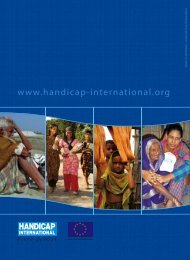Full page photo print - Harvard Law School Project on Disability
Full page photo print - Harvard Law School Project on Disability
Full page photo print - Harvard Law School Project on Disability
You also want an ePaper? Increase the reach of your titles
YUMPU automatically turns print PDFs into web optimized ePapers that Google loves.
psycho-social disabilities is another example of coercive treatments imposed <strong>on</strong> people that<br />
violate human rights. Mental <strong>Disability</strong> Rights Internati<strong>on</strong>al (MDRI) has exposed instances of<br />
abuse where a particular psychiatric “treatment” is in fact being used as a punishment and has<br />
argued persuasively that such c<strong>on</strong>duct violates the torture prohibiti<strong>on</strong>, as in the case of using<br />
unmodified ECT without anesthesia. 3<br />
Physical and mental abuses and gross neglect endangering the lives of people with disabilities<br />
housed in instituti<strong>on</strong>al facilities are widespread. Reports issued by MDRI <strong>on</strong> c<strong>on</strong>diti<strong>on</strong>s<br />
for people with mental disabilities warehoused in dismal and dangerous instituti<strong>on</strong>s detail<br />
unhygienic c<strong>on</strong>diti<strong>on</strong>s of detenti<strong>on</strong>, excessive use of physical restraints, lack of adequate<br />
food, water, clothing and medical care, and other life-threatening c<strong>on</strong>diti<strong>on</strong>s. MDRI has also<br />
documented instances of complete sensory deprivati<strong>on</strong> in barren, l<strong>on</strong>g-term isolati<strong>on</strong> cells in<br />
instituti<strong>on</strong>s. 4 These c<strong>on</strong>diti<strong>on</strong>s are examples of violati<strong>on</strong>s that may fall under torture or cruel,<br />
inhuman, or degrading treatment or punishment, depending <strong>on</strong> the circumstances.<br />
addressing human rights abuse in instituti<strong>on</strong>al settings<br />
• In 2007, a Czech regi<strong>on</strong>al court upheld the human rights of a woman who had<br />
been detained in a psychiatric hospital against her will and forced to accept<br />
psychiatric medicati<strong>on</strong> without her c<strong>on</strong>sent. She had been instituti<strong>on</strong>alized<br />
simply <strong>on</strong> the basis of an initiative by her landlord who attempted to have<br />
her unlawfully evicted. The court ruled that the detenti<strong>on</strong> violated her human<br />
rights.<br />
• In 2006, the Inter-American Court <strong>on</strong> Human Rights held that Brazil violated<br />
the Inter-American C<strong>on</strong>venti<strong>on</strong> <strong>on</strong> Human Rights in its first case c<strong>on</strong>cerning<br />
a pers<strong>on</strong> with a psycho-social disability. The case c<strong>on</strong>cerned the death of a<br />
man in a private psychiatric clinic who was subjected to beatings by clinic<br />
pers<strong>on</strong>nel and who died three days after his admissi<strong>on</strong>. The Inter-American<br />
Court held that Brazil violated his right to life and the right to be free from<br />
cruel, inhuman, and degrading treatment.<br />
• In 2001, the European Court of Human Rights held that detaining a pers<strong>on</strong><br />
with a psycho-social disability in the psychiatric wing of a pris<strong>on</strong> in a very<br />
small, hot cell with <strong>on</strong>e other pers<strong>on</strong> and inadequate ventilati<strong>on</strong> violated<br />
the prohibiti<strong>on</strong> against degrading treatment under Article 3 of the European<br />
C<strong>on</strong>venti<strong>on</strong> <strong>on</strong> Human Rights.<br />
• In 1999, the US Supreme Court ruled that requiring people with disabilities to<br />
live in instituti<strong>on</strong>s in order to access services c<strong>on</strong>stitutes illegal discriminati<strong>on</strong><br />
under the Americans with Disabilities Act. The Olmstead decisi<strong>on</strong> requires<br />
public entities to provide services and c<strong>on</strong>duct activities in the most integrated<br />
setting appropriate to the needs of qualified individuals with disabilities.<br />
3 “Behind Closed Doors: Human Rights Abuses in the Psychiatraic Facilities,Orphanages, and Rehabilita<br />
ti<strong>on</strong> Centers of Turkey.” Mental <strong>Disability</strong> Rights Internati<strong>on</strong>al (MDRI). 2005. http://www.mdri.org/projects/<br />
turkey<br />
4 “Ruined Lives: Segregated from Society in Argentina’s Psychiatric Asylums.” 2007. Mental <strong>Disability</strong><br />
Rights Internati<strong>on</strong>al (MDRI) and the Center for Legal and Social Studies (CELS). http://www.mdri.<br />
org/projects/americas/Argentina/MDRI.ARG.ENG.NEW.pdf<br />
part 2: the COnVentiOn On the rights Of persOns with disabilities<br />
87




